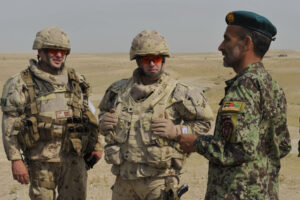Deep-Sixing Deconfliction Channels
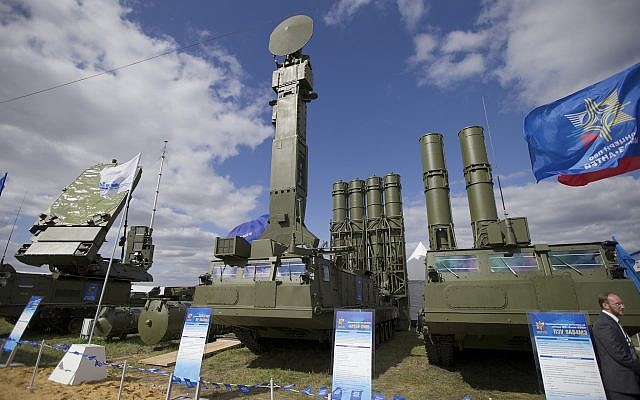 |
| In this photo, a Russian air defense system missile
system Antey 2500, or S-300 VM, is on display at the opening of the MAKS
Air Show in Zhukovsky outside Moscow, Russia. (AP Photo/Ivan
Sekretarev, file) |
"The presented objective data testifies that the actions of the
Israeli fighter pilots, which led to the loss of life of 15 Russian
servicemen, either lacked professionalism or were an act of criminal
negligence to say the least. Therefore, we believe that the blame for
the tragedy with the Russian Ilyushin Il-20 aircraft lies entirely with
the Israeli air forces and those who made the decision to carry out such
actions."
"[Those actions represented] an extremely ungrateful response to all that has
been done by the Russian federation for Israel and for the Israeli
people, recently."
Russian Defence Ministry spokesman Maj. Gen. Igor Konashenkov
"[For Israel, training against the
Crete S-300 would be] precisely what you need [to study the system’s
radar frequency, pattern and reach]."
"If you know all these
details then you are perfectly fitted to replicate this same signal,
which means you have a chance to imitate, to sort of bluff-echo [the
S-300]."
"You can brutally jam it. You can take
the signal and return it, and then you send another ping which imitates
the same signal. So instead of one target, the radar operator sees
three, five or 10 and he does not know where to fire."
Igor Sutyagin, Russian military expert, Royal United
Services Institute, London
"[S-300s in areas where Israel
operates or might want to operate would challenge its advanced,
U.S.-backed military - but not insuperably so]."
"In general, any
system can be defeated this way or that. Some are harder and some are
easier. The rule of thumb is that if your friends [the Greek military] have a
system that you are interested in, you can learn all kinds of things
about it."
Tal
Inbar, senior scholar, Fisher Institute for Air and Space
Strategic Studies, Tel Aviv
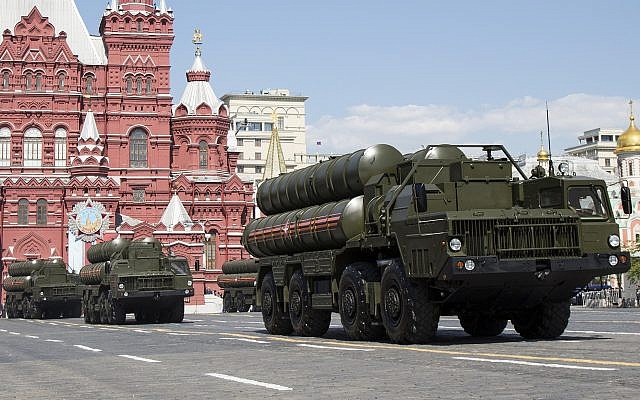 |
| Russian S-300 air defense missile systems drive during a Victory
Day military parade marking the victory in WWII in Red Square in Moscow,
Russia, May 9, 2016. (AP Photo/Alexander Zemlianichenko) |
"The information provided by the Israeli military… runs counter to
conclusions of the Russian defense ministry [that the actions of the
Israeli pilots had led to the plane being targeted by Syrian air defense
systems]."
"The Russian side proceeds from the fact that the actions by the Israeli air force were the main reason for the tragedy."
"According to information of our military experts, the reason [behind the
downing] were premeditated actions by Israeli pilots which certainly
cannot but harm our relations."
Kremlin statement
Israel had been left with the impression, just several days earlier, that its delegation to Moscow led by IAF chief
Amikam Norkin, explaining that it had provided considerable
advance warning — 12 minutes according to Israeli reports — and precise
information on the target area to the Russians before the strike; that
its jets hadn't hid stealthily behind the Russian plane, and that its planes had vacated the airspace before the Syrians ineptly and "indiscriminately" fired one of 40 anti-aircraft missiles downing the Russian plane, had sufficed to persuade the Russian military that Israel had no part in the tragedy that led to the deaths of 15 Russian airmen.
The so-called 'friendly fire' incident whereby the Russian military’s reconnaissance Ilyushin Il-20 was shot
down by Syrian missile defense systems responding to an Israeli
airstrike now, it appears, in the Russian version, is completely Israel's fault. Data
collected by Russian air defense systems in Syria ostensibly indicated
that one of the Israeli F-16 fighter jets was flying close to the much
larger Russian plane. When the F-16 was targeted by a Syrian missile it
suddenly veered off, resulting in the missile homing in on the larger
target, a version exonerating Syria. That version disputes the Israeli version that its fighters were gone long before the Syrian missiles were launched.
The Kremlin and its Defense Minister Sergei Shoigu are delivering a punishing resolution that Russia now plans to jam radars
of military planes striking off the coast of the Mediterranean —
measures obviously geared to complicate Israel’s defensive plans, inclusive of preventive airstrikes, to ensure that Iran's deepening of its military presence in
Syria is foiled, and to effectively thwart the transfer of weapons in Syria to Hezbollah. "In regions near Syria over the Mediterranean Sea, there will be
radio-electronic suppression of satellite navigation, on-board radar
systems and communication systems of military aviation attacking objects
on Syrian territory", assured Shoigu.
“This is absurd. The Syrians down a Russian plane and get the prize of an
advanced weapons system, said Israeli Middle East analyst Ehud Ya’ari. Quite so. As absurd as a Turkish fighter jet downing a Russian warplane that had strayed into Turkish airspace, and after sanctions imposed to injure Turkish economic interests, Ankara and Moscow find themselves steadfast pals despite their clear differences. As absurd as the Kremlin failing to learn its lesson when it provided Ukrainian-Russian rebels with a sophisticated anti-aircraft missile which it used to destroy a Malaysian passenger airliner out of the skies over Ukraine, causing hundreds of deaths.
The unfortunate episode whereby 15 Russian airmen lost their lives stems from a confusion of actors in the region all of whom focus on their own special perspectives, advantages, priorities and influences. This is a regional tinder-box, apart from the fact that wholesale slaughter has been perpetrated by the leader of the country on his own civilian population in a sectarian rebellion. In the Syrian regime's determination to foil the efforts of the Syrian opposition and destroy its leaders, it has not hesitated to destroy its civilians as well. A half-million Syrian lives lost, and millions made homeless, more millions, refugees.
Without the intervention of the region's most infamous supporter of terrorism, the Islamic Republic of Iran, its elite al Quds division of the Republican Guard Corps involved in blueprinting strategy along with Iran calling in its Shiite militias, including Lebanon's deadly Hezbollah group, Bashar al-Assad would never have been able to surmount the legions of Syrian Sunni rebels, much less the presence of foreign fighters and terrorist groups. The tide turned completely with Vladimir Putin's decision to make a place for Russia in the Middle East, abandoned by the Obama administration.
The Kremlin-backed Syrian regime is guaranteed its survival. Turkey, which serviced the needs of a number of Sunni terrorist groups, could have intervened at an early stage of the rebellion to remove the Syrian ruler it detested, but Turkey, despite having the second largest armed forces in NATO, awaited action by NATO and the U.S. to intervene. Now Turkey, a member of NATO, has aligned itself however reluctantly with Russia and Iran, swallowing their insistence that Assad prevail. Russia has succeeded in ingratiating itself with Syria, Iran and Turkey, a grim balancing act, but one the Kremlin is well suited to.
And Vladimir Putin appeared, while negotiating all of these ties and juggling the various interests with his own, to have had a soft spot for Israel and its existential dilemma, threatened by all the actors, governmental and non-governmental that he dances with. The agreement between Putin and Netanyahu that Russia would countenance Israeli strikes against Iranian and Hezbollah transfers of weaponry being stockpiled for the purpose of destroying Israel was built on slender trust. It appears now to have been shredded.
Sunday's announcement that Russia is now prepared to deliver the advanced anti-aircraft systems it had held off in response to Israel's appeals, testifies to that. Prime Minister Benjamin Netanyahu's Monday call to Vladimir Putin for a last appeal was rebuffed. Israel, having ensured its military was schooled in methods [war games with Greece] whereby it could strategically bypass detection by the more technically advanced system to be released in two weeks' time to Syria will likely manage the additional challenge to its Syrian overflights to destroy the weapons threatening its survival.
But its very survival is at stake here, which is vastly different from the reason that Russia is in Syria; to advantage Russian political ambitions and military expansion.
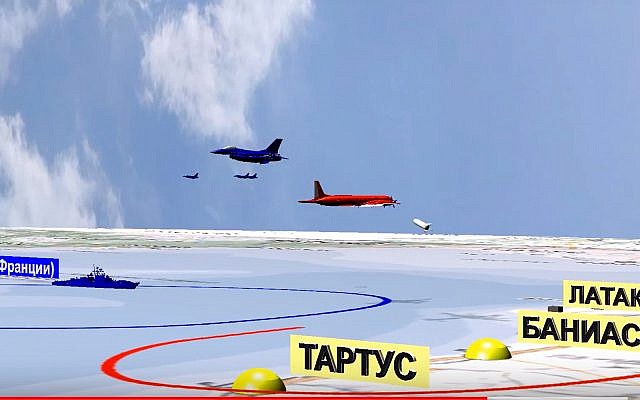 |
| A computer simulation released by the Russian Defense Ministry, Sunday,
September 23, 2018, purports to show Israeli jets near a Russian
reconnaissance plane, in red, off Syria’s coast before it was
accidentally shot down by Syria forces responding to the Israeli air
strike. The Russian Defense Ministry on Sunday again blamed Israel for
the downing of its plane, as Syrian government forces are thought to
have mistook the Russian Il-20 reconnaissance plane for an Israeli jet
and shot it down Monday, killing all 15 people aboard. (Russian Defense
Ministry Press Service via AP) |
Labels: Air Disaster, Conflict, IDF, Israel, Military, Russia, Syria
/arc-anglerfish-arc2-prod-mco.s3.amazonaws.com/public/FOUXY5WY7JFT5JTDHA4BCYSDZM.jpg)
/arc-anglerfish-tgam-prod-tgam.s3.amazonaws.com/public/SWKA6ZIE6RD47BVTSCJE2CPSDE.JPG)

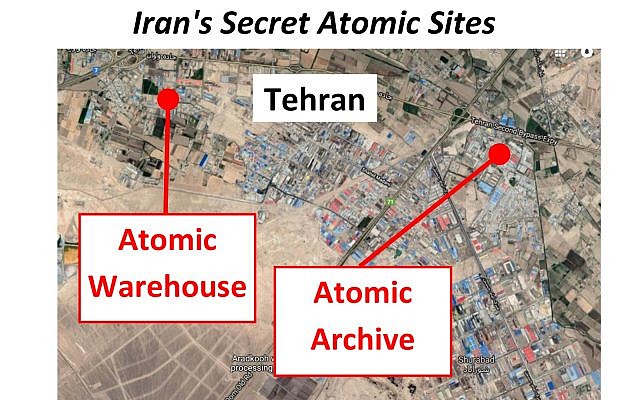

/https://www.thestar.com/content/dam/thestar/news/gta/2018/09/26/crown-calls-one-year-jail-sentence-unfit-after-judge-takes-anti-black-racism-into-account/scales_of_justice.jpg)







